Where our children’s future matters most.
Our pupils will have access to ‘the best that has been thought and said’
Accounting for our strengths and challenges our three curricular goals are:
CURRICULUM GOAL 1: To ensure every child is secure in English, Maths and computingCore skills in English, Maths and Computing underpin all aspects of learning and provide necessary skills to become ‘future ready’. |
CURRICULUM GOAL 2: To deliver a broad, balanced and rich curriculum that creates independent, resilient critical thinkersOur six school values underpin this ethos: teamwork, respect, kindness, courage, ambition, resilience. |
CURRICULUM GOAL 3: Deliver a curriculum that champions diversity and equalityPupils have a global perspective and are well prepared for life in modern Britain. Our pupils see themselves represented in what they learn and the school itself so that equality, diversity and anti-racism are seamlessly interwoven into the curriculum. |
CURRICULUM GOAL 1
- Reading and oracy is at the heart of all subjects. We have a ‘no hands up policy’ and talk-
 partners across the school so all children participate fully in all class discussions.
partners across the school so all children participate fully in all class discussions. - There is a strong focus on language acquisition and oral confidence, particularly in the Early Years but maintained across the school. We use targeted language interventions such as Colourful Semantics and ‘talk through stories’ to support vocabulary developmen
t. - In KS2, debating units are part of the taught curriculum allowing all pupils to become confident communicators.
- Reading is the bedrock of our curriculum. We teach Phonics scheme RWI (Read Write Inc), which is taught with passion and purpose from nursery to year 2. Our children love English and comment on the exciting books that they are reading.
- We consciously support our pupils to be lifelong readers through developing a love of reading. Every class has a rich daily story time and our teachers advise and guide children’s choices. There are ‘reading stations’ around the school, all in communal areas, where children can choose to read for pleasure. There are two school libraries and every classroom has a book corner and class library.
- Mathematics – We prioritise the key skills that are required to be successful mathematicians.
 Our children love mathematics and we encourage them to understand and apply maths as part of our STEM activities.
Our children love mathematics and we encourage them to understand and apply maths as part of our STEM activities.
- We follow a mastery curriculum in Mathematics using the ‘White Rose’ scheme of learning. Mastering maths means pupils of all ages acquiring a deep, long-term, secure and adaptable understanding of the subject.
- We support our parents who are unsure about new techniques by making study guides available, as well as parents help workshops when needed.
- The curriculum for maths has been carefully sequenced this year to account for gaps following the global pandemic. Daily arithmetic practice is built into every maths lesson. Beginning every maths lesson with one of our ‘non negotiable’ objectives allows pupils to recall and revisit taught content, ensuring they know more and remember more.
- We do not accelerate pupils into new content, instead we focus on deepening through reasoning and application to unfamiliar contexts.
- For fluency practice we follow the Mastering Number Programme in KS1 and use Times Tables Rock Stars in KS2, which are both carefully sequenced programmes allowing pupils to learn and practice number bonds to 10 and times tables.
- Parents are given a free book ‘Mental maths – 5 A Day’ to support practice at home.
- Computing children are able to explain ways in which they should keep themselves safe online.
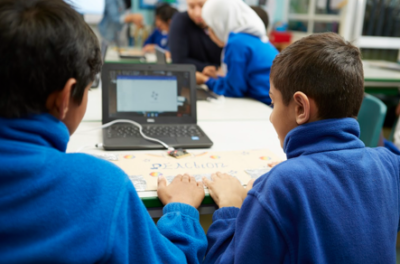 Teachers plan wider opportunities for pupils to learn and practise their Computing skills in other curriculum areas, such as through research and creating presentations and databases in subjects such as History and Science.
Teachers plan wider opportunities for pupils to learn and practise their Computing skills in other curriculum areas, such as through research and creating presentations and databases in subjects such as History and Science.
- Using our research from Singapore we looked at the different aspects of the computing curriculum like digital literacy, citizenship, navigating the internet and the concept of digital wellness. The school links with technology leaders to ensure our pupils have memorable experiences and learn from the experts.
CURRICULUM GOAL 2: To deliver a broad, balanced and rich curriculum that creates independent, resilient critical thinkers
Our curriculum is based on international research projects that have been embedded in the Maryland curriculum including research trips carried out by our own staff who visited China, Bangladesh, Japan, Finland, Sweden, the Netherlands and Singapore. Our six school values are pillars central to this ethos:
Teamwork Resilience Respect Ambition Courage Kindness
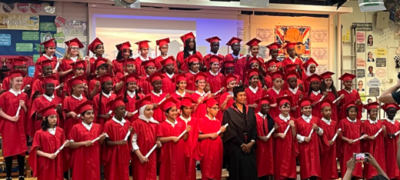
We want our children to be:
- Caring, both of others and themselves: Our CPSHE (including RHE) lessons delivered through the Jigsaw scheme of work, RE and online safety curriculum support pupils’ self-awareness, confidence and self-esteem and aim to give pupils the knowledge, skills and understanding they need to lead happy, healthy and confident lives and build healthy relationships.


- Love of learning: We want our children to be active participants in their learning, independently seeking out learning and knowledge for its own sake’. Our Smart Zone is an area that identifies children’s learning styles, talents and ambitions as part of our research into the multiple intelligences theory and growth mindset. (visual-spatial, verbal-linguistic, musical-rhythmic, logical-mathematical, interpersonal, intrapersonal, naturalistic and bodily’)
- Ambitious, our school motto is ‘where children’s future matters most’. Maryland children win many sporting competitions and we have an England squad basketball coach on our staff. Our Fencing club will soon be duelling at borough level. We proudly won Newham’s Panathlon with our SEND team. We live the Olympic values and have one of the 2012 Olympic torches on display in our hall.
- Risk takers and problem solvers: have a willingness to take calculated risks and to view mistakes as learning opportunities. We believe that intelligence is not fixed so we nurture a growth mind-set in children who learn that they need to work hard to succeed. For instance our pupils in year 6 summer geography topic is ‘Are we damaging our world?’ We are
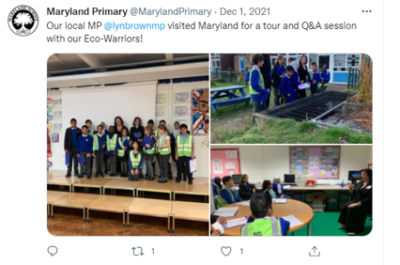 aware of the efforts that Swedish environmentalist activist Greta Thunberg is taking in challenging world leaders to take immediate action to halt the climate crisis.
aware of the efforts that Swedish environmentalist activist Greta Thunberg is taking in challenging world leaders to take immediate action to halt the climate crisis. - Our eco-warriors are devising ways to solve the problem of single use plastics and food waste even having their questions read out in the chamber at the House of Lords.
- Independent critical thinkers: being confident enough to form and defend their own opinions as active citizens. Many of our lessons focus on big questions to explore and answer. Debating skills are taught in the school and pupils are encouraged to use these skills across the curriculum.
- Global citizens: our pupils know the wider world – and their place in it. They take an active role in their community and work with others to make our planet more peaceful, sustainable and fairer. The children in Year 2 throughout the year produced artwork as part of the British Council project ‘The Story of Water’. Their work was exhibited at a local art gallery and the school has linked with a school in Ghana to share best practice.
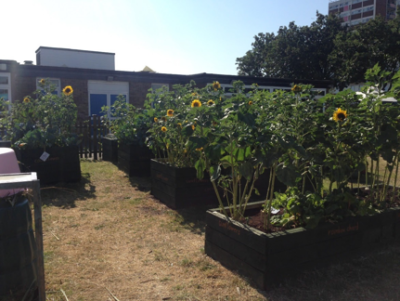

- Researchers and to be digitally literate: we encourage independent research and opportunities to develop independence in all areas of the curriculum. Our computing curriculum is based on the notion of pupils being ‘content creators’ rather than passive consumers of technology. Maryland pupils are winners in local STEM competitions
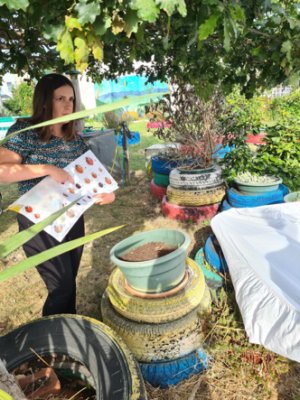
- Sustainability warriors. Our pupils have a deep appreciation of the natural world and sustainability. Our Nature Garden won a Royal Horticultural Society Gold Award and is regularly a place where our children can learn about and be around nature. Cluckingham Palace is home to our beloved chickens who provide us with eggs (of varying colours) and even more learning opportunities. Rich opportunities to use our outdoor space are embedded in our Science curriculum where we bring learning to life.
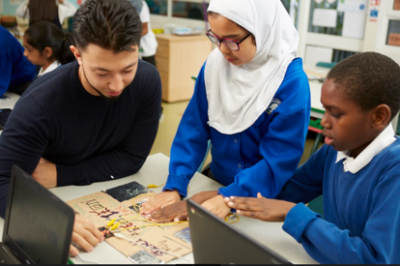
- Future ready. We are lucky to work with the UCL engineering department who facilitated a Harry Potter wand workshop where the pupils wrote code to cast a spell. Using ipads and their wand, by waving the wand, they could perform tricks.
- With computing, teachers will expect children to progress by using devices without adult support as the learning outcome is significantly better than if it is a teacher-led session. This is due to children using trial and error without adult support. All devices are limited in their reach into the digital world to ensure pupil safety
- There is an emphasis on teaching pupils basic skills such as typing proficiency. Maryland was one of the first to become a Google school. The use of G suite applications is well established for use in school and at home.
- The school has excellent extra curricular opportunities for pupils in Computing. For example, state of the art equipment such as the school’s green screen were showcased at a Technology Fair for pupils and parents.
- The school has well established links with University College London Engineering Department and charities such as Academy Achievers. These links enable children to consider how Computing can be used in future careers and fit with the school value of ambition.
CURRICULUM GOAL 3: Our curriculum champions diversity and equality
“We believe in a world where everyone should be treated with respect, fairness and equity and as educators, we will actively work to combat all forms of discrimination that stand in the way of this belief. We will educate our children and young people to recognise and reject racism and provide a safe environment for them to speak about and speak out against injustice.”
Newham pledge, written by our Headteacher.
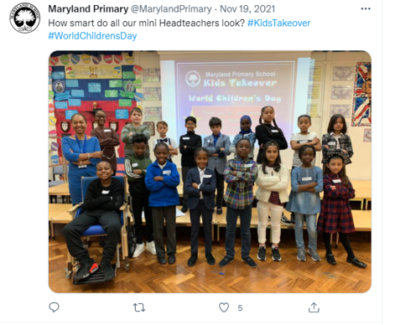
- Maryland’s anti-racism and equality programme empowers teachers, children, young people and communities with the courage, confidence, and self-belief to create a safe environment for meaningful conversations about the existence and impact of racism.
- We teach equality and anti-racism through our project ‘Art4Change’. Art4Change includes three art projects designed to challenge racism through conversation and curriculum. They are ‘Recognising the Past, Shaping the Future’, ‘Strength, Determination and Courage’ and ‘A United Future’.
- Learning through Art about subjects such as History and English, enriches the very nature of those subjects, bringing them to life visually.
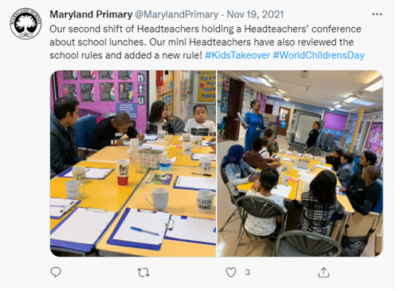
- The Arts encourage self-expression, creativity and can build confidence, as well as a sense of individual identity.
- Our pupils experience how to take time to observe the world and different cultures.
- Teaching through the Arts can help present difficult concepts, such as diversity visually, making them easier to understand.
- Learning through Art about subjects such as History and English, enriches the very nature of those subjects, bringing them to life visually.
- Education builds understanding. Pupils know the difference between anti-racist and non racist. They stand up and say if something is not right. They appreciate the richness of culture in our diverse community, and celebrate differences.
- Pupils’ learning experiences are one of awe and wonder, both engaging them in the ‘here and now’ but also providing them with moments that will shape their future lives. As part of World Children’s Day, the children took over the school as part of Kids Takeover, there was a headteacher conference on rewards and school lunches.
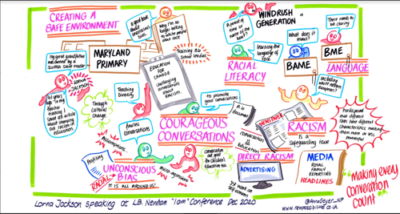
- Maryland curriculum is enriched with exciting and memorable experiences, visits and visitors, taught through Mandela’s philosophy of ‘Ubuntu’, we are what we are through the contribution of others.
- We think carefully about guest visitors. Visits have included MPs such as Dawn Butler and Lyn Brown, Franciscan monks and authors. We facilitate specialist weeks that build real experiences into the curriculum to enrich learning and may include trips so pupils can apply learning to real life.
- Our curriculum reflects our community. We celebrate all of the major faiths through the taught RE curriculum and the year group festival assemblies so our pupils not only have significant knowledge of but also learn from other cultures/faiths to develop British values such as tolerance.

- Our pupils with SEND and disadvantaged pupils fully access the curriculum. We are an inclusive school and take pride in ensuring pupils with SEND have access to quality personalised learning opportunities and a
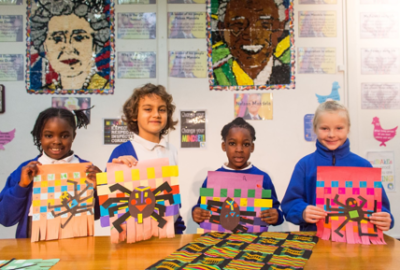 range of intervention groups. The school has its own soft play and sensory room so that provision is accessible and appropriate.
range of intervention groups. The school has its own soft play and sensory room so that provision is accessible and appropriate. - ‘In awe of the Heroes Exhibition by pupils at @MarylandPrimary sponsored by @NewhamLondon to celebrate #BlackHist
- oryMonth. This is education at its best- art honouring Black history and celebrating the achievements of Black Newham heroes. Well done to everyone involved.’
How do we ensure that there is curricular progression?
- In order to achieve our goals, we have carefully planned our curriculum so that it is broad and ambitious.
- We follow the National Curriculum, going beyond it in some areas and have developed age-related curricular end points through progression documents in the core subjects
- Schemes are in place in literacy (RWI and Literacy Tree) and in maths (White Rose) to provide a strong foundation and consistency for all our staff when delivering core subjects. As they have been developed by curriculum experts, they are carefully sequenced to ensure careful progression and clear end points.
- We have adopted a subject specific approach and have made careful cross-curricular links to optimise this understanding where it is sensible to do so.
- We use subject experts to teach the curriculum in PE and deploy internal expertise (team teaching and planning support) to support French, Science, Computing, Mathematics and phonics.
- We pursue a mastery agenda across all subjects, building up learning in small steps and ensuring students progress, learning lessons from current research. Our approach to planning across the curriculum ensures that children revisit concepts to ensure knowledge, vocabulary and skills shift from working to long-term memory.
- Medium term plans in all subjects mean all staff are aware of where learning fits into a broader sequence of learning.
- Our intervention programmes are carefully targeted and rigorous, ensuring that pupils who begin to fall behind are targeted for further support enabling them to keep up

